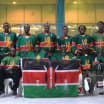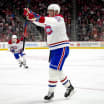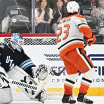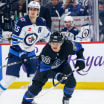NEW YORK --Ryan Callahan remembers the moment Chris Kreider first walked into the New York Rangers dressing room. He knew little about the prospect, who was six days removed from winning his second NCAA championship with Boston College, but he immediately registered the presence, the size, the bearing of the then-20-year-old.
Rangers leaning on Kreider entering must-win Game 6 against Lightning
Forward's hard work, drive to reach next level could be key in keeping season alive in East Final
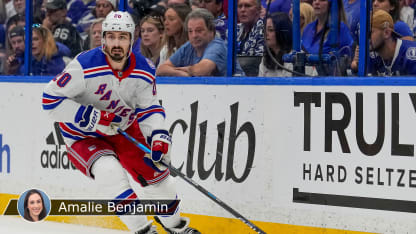
"You could see right away that he was impactful," said Callahan, the former Rangers captain. "The biggest thing was the moment didn't seem too big for him.
"You could tell right away that he was going to be an important player for the organization."
It has been 10 years since Kreider made his NHL debut for the Rangers in Game 3 of the 2012 Eastern Conference First Round against the Ottawa Senators, a decade, a lifetime. Kreider is no longer the ingenue, is now the grizzled veteran and the longest-tenured Ranger. He wears an A, and could someday see that upgraded to a C.
Selected No. 19 by the Rangers in the 2009 NHL Draft, the forward's importance has grown, as he has piled up games and goals and experience, as he has tied Rod Gilbert with 34 goals, the most all-time for a member of the Rangers in the Stanley Cup Playoffs.
And he may never be more important than he is now, as he leads the Rangers into yet another elimination game, with the Rangers down 3-2 to the Tampa Bay Lightning in the best-of-7 Eastern Conference Final entering Game 6 at Amalie Arena on Saturday (8 p.m. ET; ESPN, ESPN+, CBC, TVAS, SN).
"Knowing Chris Kreider, I think he relishes that moment of being the guy now, where a little bit younger in his career they had some guys in front of him that were 'the guys,'" Callahan said. "Now he's in that spot. It's become his team."
RELATED: [Complete Rangers vs. Lightning series coverage]
In the playoffs this season, Kreider has scored 10 goals, tied with Mika Zibanejad for the Rangers lead. His 16 points are tied with Artemi Panarin for third on the Rangers. He has five points (two goals, three assists) in the first five games against the Lightning.
And yet, the Rangers need more. They need the Kreider, now, 31, that they saw all season, the one that scored 52 goals, including an NHL-best 26 on the power play, the Kreider that he worked so hard to build.
Of course, for Kreider, the work part was easy. It was ingrained.
It was so much a part of Kreider, even as a teenager, even in high school, that it might just have changed the course of Garnet Hathaway's life.
Kreider would pick up Hathaway, now a forward for the Washington Capitals, on the way back from lacrosse practice at Phillips Andover Academy, the tony prep school the pair attended, and take him to the gym around the corner.
"He would still out-lift me," Hathaway said, still impressed, even more than a decade later. "He would do a full practice and then train even harder than I thought was physically possible."
It was eye-opening.
"I was introduced to the type of work ethic needed to get to the next level," said Hathaway, who lived with Kreider's family for a summer.
The work ethic hasn't waned in the intervening time. If anything, it has only gotten more entrenched, more profound, as the Rangers forward has remade his game over the years, as he has turned himself from a straight-ahead player to a talented net-front presence, as he has grown his game and, this season, arrived as a goal-scorer.
Before this season, Kreider had never scored more than 28 goals, which he had done twice (2016-17 and 2018-19). His 52 this season were good for third in the NHL behind Toronto Maple Leafs forward Auston Matthews (60) and Edmonton Oilers forward Leon Draisaitl (55). He blew away his career high in points, with 77, 24 more than he scored in 2016-17. The 26 power-play goals were two more than Draisaitl.
"I think Chris has evolved as a player," said Montreal Canadiens coach Martin St. Louis, who played with Kreider from 2013-15 on the Rangers. "I think [he] always had the fastball, coming down the wing and getting in behind. I think he's learned a few other pitches now. He's not just a fastball thrower.
"He's controlling his speed better and it allows him to process the game probably a little bit better in getting to the right areas. He's always been very good in front, so he hasn't lost that, but I think if there's probably one thing that 'Kreids' does better now than he did in the past is he probably manages his game way better from blue line to blue line in terms of what kind of speed he brings.
"Anybody that's got great speed, it's important, you need the speed, but to keep staying successful in this league, like I compare it to a baseball pitcher, if you only throw gas, eventually they just time it right and they hit home runs. That's why you need many different pitches."
And Kreider has worked hard on that, as he did at Andover, as he did at BC, as he did in his introduction to the NHL in those 2011-12 playoffs, as he has continued to do for 10 seasons in New York, 10 seasons in which the Rangers have reached the Eastern Conference Final four times and gotten as close to winning as the Stanley Cup Final in 2014 -- but no closer.
It's evident in what he does in front of the net, in particular, all the hours he spends practicing tips, working his stick, getting his reflexes and his hands and his eyes in order.
Joe Pavelski of the Dallas Stars has long been regarded as the best at the art. But maybe not anymore.
"I think he has taken the title as best net-front presence player in the League and deflector of the puck," said Joe Micheletti, a Rangers analyst on MSG Network. "For years, there wasn't anybody better. I think Chris is now."
But it wasn't something that Micheletti -- or, really, anybody -- saw coming.
For that matter, many aren't exactly sure it will continue.
"I don't know that Chris Kreider is a 52-goal scorer, although he got 52 goals this year," ESPN analyst and former NHL player Ray Ferraro said. "How he never scored 30 is beyond me. He's too big, he's too powerful, he's got too good hands not to have been in that space before.
"When I watch him, I see a confidence, an assertiveness, a realization of his place as a leader in this group, which is really incredibly young."
Which makes sense. Kreider has been doing that forever, going back to those days with Hathaway at Andover. He has been working and working and working, getting closer and closer to the potential that the scouts saw at such an early age, to the potential that has both dogged him and powered him.
Because, as Hathaway said, "potential is a funny word."
There would be hot streaks, for 10 games, a dozen, a month. The thought would be that this would be the breakthrough, the season he hits 30 or more. Maybe 40? It would never quite materialize. The hot streaks never became hot seasons. Until now.
"He'd always have these stretches, just about every year, these stretches where he'd go dry for six or eight weeks, to the point where he would be unnoticeable for long stretches of time," Micheletti said. "It was always kind of a head scratcher. We knew it wasn't lack of trying. It wasn't lack of caring.
"He was a real enigma."
He added, "It's not that he had bad seasons. It's just that he didn't have the seasons that everybody thought he could have."
Kreider has finally had that season. He has put it all together. All of it. The work and the desire and the experience. The leadership and the talent. The shot and the speed. Even if it never happens again, if he never again tops 30 or 40 or 50, Kreider has had a season for the ages.
Now it's up to him to extend that season.



